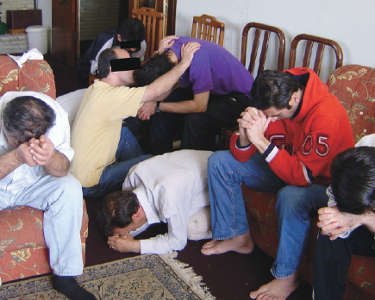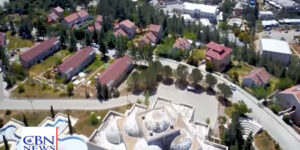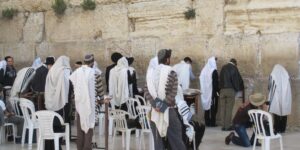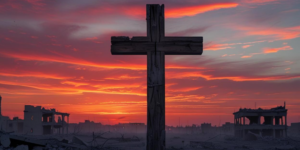Hostile Rhetoric Turns Up Heat on Iranian Christians
 Increased public statements against Christianity in Iran have intensified pressures on Christians, sources said, but at their core they reflect Islamic leaders’ dismay with the growth of house churches and may signal dissension within Iran’s leadership.
Increased public statements against Christianity in Iran have intensified pressures on Christians, sources said, but at their core they reflect Islamic leaders’ dismay with the growth of house churches and may signal dissension within Iran’s leadership.
“The reality is most of the house churches are so hidden that the government can’t do anything, and they know it,” said a regional expert who requested anonymity. “They just see how the house churches are still growing.”
The source said that since mass arrests at the beginning of this year, Christians have been more cautious.
Another Iranian Christian, a pastor, said the comments likely foretell more arrests.
“I believe that a new wave of persecution is underway,” he said. “The authorities are in the process of evaluating the situation.”
Some sources told Compass the comments of Islamic leaders may indicate a power struggle between Supreme Leader Ali Khamenei and Iranian President Mahmoud Ahmadinejad. This bodes ill for Christians and minorities in general, they said.
“When there is conflict in the government and division, then all the minorities will have a hard time,” said another Christian Iranian who requested anonymity. “If, for example, Ayatollah [Mohammad Taghi Mesbah] Yazdi says ‘We have to end the Christian movement,’ as he said a few weeks ago, that is enough for his followers in the government to go and arrest Christians.”
In May, Yazdi said authorities have not done enough to quench the growth of Christian house churches, considering the “massive funding” the government has spent toward that end. Yazdi made his statement in a meeting with the heads of the Islamic Propagation Center of Qom. His statement was originally publicized on the Iranian Student News Agency website, according to Iranian Christian news agency Mohabat News.
Given the “the growth of Christianity in some of the provinces, the actions taken by the government and the judicial authorities, and the massive funding of such programs, the desired results have not been achieved, and this is partly due to the undisciplined attitude and lack of proper supervision of these programs,” Yazdi reportedly said.
Yazdi suggested that the government set up a central system to monitor and coordinate the suppression of churches.
Another Christian source said the political situation in Iran is too complicated to predict future arrests on the basis of religious leaders’ public statements. The source, who requested anonymity, said that Yazdi is one of Iran’s most influential clerics and receives government funds to carry out his work. This year he has received a fraction of the funds he has in the past. His public statement could be a request for more money, the source said.
“Maybe he’s just asking for more money,” said the source. “There are elements that indicate there could be another wave of arrests, but maybe he’s saying something different: ‘We should be changing our tactics [against Christians], so I need more money.'”
Today Mohabat reported that a faculty member of Mehdi Seminary in Qom claimed that “the enemies of Islam” are providing $50,000 a year to some house churches. The general director of comparative religious studies, Hojatoleslam Tarashioon, was speaking at the seminary in Qom, the country’s Shiite center and breeding ground for Iran’s Islamic clerics and leaders.
“This cult in recent years has become active, and today they work under the pretext of cultural and educational centers and have expanded their activities in several provinces,” Tarashioon said, according to Mohabat.
Religious leaders also publicly attacked the country’s underground house church movement last fall. In October, Khamenei said Iran’s enemies wanted to shake the country’s religious and societal values through the spread of Baha’ism and a network of Christian house churches.
Experts believe these public attacks on Christians, and particularly Khamenei’s, resulted in authorities arresting over 120 Iranian Christians between December and January. Most of those detained were converts from Islam.
Still in Prison
Of those arrested at the beginning of this year, all but three were released, according to a recent report from the Elam Ministries.
Farshid Fathi, 32, has been incarcerated since Dec. 26, at the notorious Evin prison in Tehran. Authorities refuse to release him and have pressed no formal charges. They have kept Fathi in solitary confinement for months and have used psychological torture methods on him to extract more information on Christian networks in Iran. They have allowed him to speak to his family only once a week, according to Mohabat. Fathi is married and has two children.
Authorities have kept Abrahim Firuzi in prison at Robat Karim near Tehran since Jan. 8, according to Elam. They charged him with evangelizing, keeping many copies of the Bible and apostasy, or leaving Islam, reported the ministry. His family is unable to pay bail.
Another Christian, Noorollah Ghabitizadeh, has been in prison since Dec. 24, in Defzul in western Iran, according to Elam.
A fourth Christian, Masoud Delijani, was arrested on March 17 in Kermanshah and remains in prison.
Ethnic Armenian Christian Vahik Abrahamian has been in prison since Sept. 4. On May 1 authorities released his wife, Sonia Keshish-Avanesian, who was imprisoned with him, according to Elam. Abrahamian also spent two months in prison between February and April of last year. He was released on bail and re-arrested in September.
Yousef Naderkhani, a Christian from Rasht, has been in prison since October 2009. Authorities found him guilty of apostasy on Nov. 13, and handed him the death penalty. His lawyer has filed an appeal with the Supreme Court, and Nadarkhani is awaiting a trial date. Authorities have allegedly treated Nadarkhani harshly, both physically and mentally.
On May 31, authorities arrested another Christian, Behnam Irani of Karaj, according to a reliable source.
Iran’s Constitution gives Christians “protected” religious minority status, but in practice they face substantial societal discrimination, according to the U.S. Department of State’s International Religious Freedom Report 2010.







































